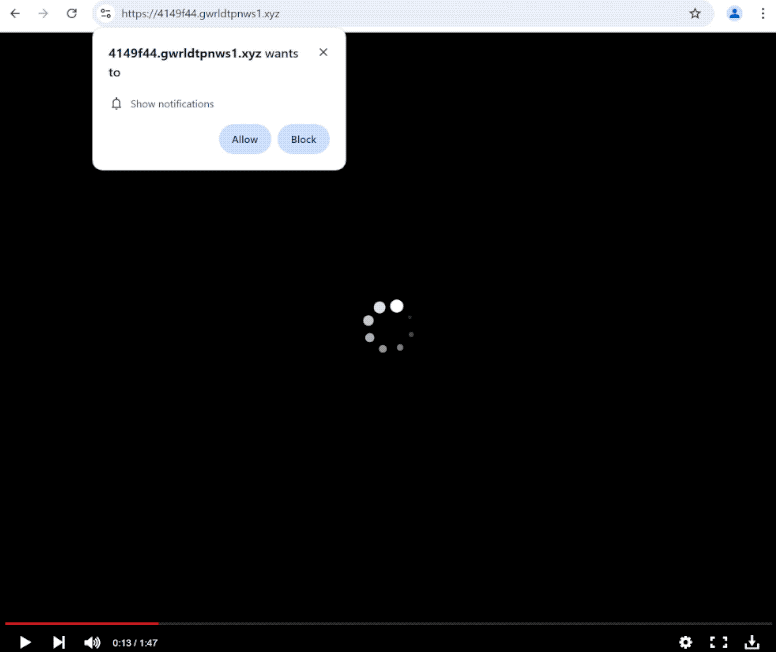Remove gwrldtpnws1.xyz pop-up ads
gwrldtpnws1.xyz is a deceptive website that misuses a browser feature to spam users’ desktops with ads. When you get redirected to the site, you will immediately get a browser alert saying “gwrldtpnws1.xyz wants to show notifications”, and if click “Allow”, the site will be authorized to show notifications on your desktops. Those notifications will be questionable ads, which could expose you to potentially malicious content, including malware and scams. Fortunately, even if you give the site permission, it’s not difficult to revoke it in your browser’s settings.
gwrldtpnws1.xyz is a very generic site and is identical to thousands of other sites. They all look more or less identical and share the same goal: to spam your desktop with advertisements. To do that, they misuse a legitimate browser feature that allows sites to deliver notifications on desktops. While many reputable websites, especially news outlets, use this feature to keep users updated without requiring them to visit the site, it can be exploited by sites like gwrldtpnws1.xyz.
When you get redirected to gwrldtpnws1.xyz, it will show a video player that suddenly stops. The site will prompt you to enable notifications in order to watch the video. A browser alert will appear saying “gwrldtpnws1.xyz wants to show notifications”. If you click “Allow”, you will start receiving ads on your desktop. A lot of these advertisements will be designed to mimic genuine system notifications and can easily confuse users due to their similar appearance. This can pose a risk since some of these ads might be malicious, potentially leading users to download harmful software.
Just to be safe, you’ll want to check your computer for an adware infection. If adware is found, it will need to be removed to stop the redirects. You should also need to install an adblocker program to block both redirects and pop-ups. Additionally, it’s important to revoke any permissions you may have granted to this or any other questionable site to show notifications. The final section of the report will provide detailed instructions on how to do this.
Reasons why you are redirected to sites like gwrldtpnws1.xyz
If you find yourself being redirected to websites like gwrldtpnws1.xyz unexpectedly, it could be due to adware on your device. Redirects may also be triggered by ad-heavy sites. Websites that feature explicit or pirated content are often labeled as high-risk because they tend to host dubious advertisements. Clicking on anything on these sites can lead to unwanted redirects. To block the redirects, consider installing an adblocker program and ensure you have anti-virus software on your system.
Frequent and sudden redirects might indicate the presence of adware on your computer. While adware is generally not harmful in a direct sense, it primarily aims to bombard you with advertisements. It often sneaks in through free software bundling, where it’s bundled with other programs as an optional extra offer. While these offers are technically optional, they are hidden during installation, leading many users to not notice them. To view the offers and be able to prevent their installations, always choose Advanced (Custom) settings when installing free programs. If those settings show that offers have been added, you simply need to uncheck the offers.
Keep in mind that legitimate programs will not use software bundling to install as it’s a controversial installation method. Programs that do use it are often detected as potential threats by various anti-virus software.
gwrldtpnws1.xyz removal
If you find yourself being redirected while visiting questionable websites, simply close the tab and consider using an adblocker program in the future. However, if adware is causing the problem, you’ll need to remove it to stop the gwrldtpnws1.xyz redirects. This process is straightforward, especially if you use an anti-virus program like WiperSoft. Once the adware is removed, the redirects will stop. Additionally, if you’ve allowed the site to send notifications, you’ll need to revoke its permission. Below are instructions on how to do this if you’re unfamiliar with the process.
- For Mozilla Firefox: Open Menu (the three bars top-right corner) -> Options -> Privacy & Security. Scroll down to Permissions, press Settings next to Notifications, and remove gwrldtpnws1.xyz and any other questionable websites. You can permanently turn off these notification requests by checking the “Block new requests asking to allow notifications” box in the same Notifications settings.
- For Google Chrome: Open Menu (the three dots top-right corner) -> Settings -> Privacy and security -> Site Settings. Click on Notifications under Permissions, and remove gwrldtpnws1.xyz and any other questionable websites. You can stop these notification requests permanently by toggling off “Sites can ask to send notifications”.
- For Microsoft Edge: Open Menu (the three dots top-right corner) -> Settings -> Cookies and site permissions -> Notifications. Review which sites have permission and remove gwrldtpnws1.xyz and any other questionable websites. You can permanently turn off these notification requests by toggling off “Ask before sending”.
Site Disclaimer
WiperSoft.com is not sponsored, affiliated, linked to or owned by malware developers or distributors that are referred to in this article. The article does NOT endorse or promote malicious programs. The intention behind it is to present useful information that will help users to detect and eliminate malware from their computer by using WiperSoft and/or the manual removal guide.
The article should only be used for educational purposes. If you follow the instructions provided in the article, you agree to be bound by this disclaimer. We do not guarantee that the article will aid you in completely removing the malware from your PC. Malicious programs are constantly developing, which is why it is not always easy or possible to clean the computer by using only the manual removal guide.

